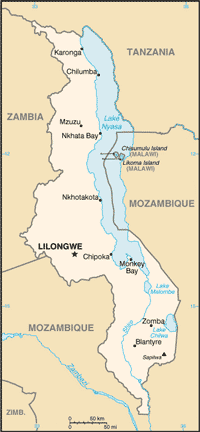Malawi
HIV/AIDS in Malawi
- 10.3% Estimated HIV Prevalence
(Age 15–49) (2013) - 48,000 Estimated AIDS Deaths (2013)
- 790,000 Estimated Orphans due to AIDS (2013)
- 368,690 Reported Number of Adults Receiving Antiretroviral Therapy (ART)(2012)
- 76% Estimated ART Coverage per WHO 2010 Guidelines (2012)
SOURCE:
UNAIDS Gap Report, 2014; UNAIDS Global Report, 2013

Strategic Focus
The CDC-Malawi office opened in November 2001 and works with the Ministry of Health (MOH) to build their health system capacity and implement high-impact HIV programs, including HIV testing and counseling (HTC), prevention of mother-to-child transmission (PMTCT), antiretroviral therapy (ART), and more recently, the voluntary medical male circumcision (VMMC) program.
Building Workforce Capacity
CDC works with the MOH and various training institutions to address healthcare workforce shortages by investing in pre- and in-service training through support of student bursaries, revision of pre-service training curricula, improvement of training colleges infrastructure, and mentoring of teaching staff. CDC has also established a residency program for Obstetrics and Family Medicine, and is collaborating with MOH to institute the Field Epidemiology Training Program (FETP).
Strengthening Laboratory Systems
CDC supports the MOH in establishing and sustaining a tiered approach to strengthening laboratory capacity through an international accreditation process. National diagnostics standards and guidelines have also been developed to assure the quality of laboratory test results throughout the country.
Strengthening Surveillance and Health Information Systems
CDC continues to provide technical assistance to help build the country’s capacity to collect and analyze data for improved program decision-making. CDC provides technical and financial support to monitor transmission and emergence of HIV drug resistant strains, and monitors the impact of HIV interventions on prevalence and incidence.
Key Activities and Accomplishments
CDC worked with the MOH to scale up the PMTCT Option B+ approach, which provides lifelong ART to all HIV-infected pregnant and nursing women regardless of CD4 count or clinical stage. CDC has supported the expansion of Option B+ to virtually all health facilities in the country, dramatically increasing the number of HIV-positive pregnant and breastfeeding women on ART, and preventing vertical transmission.
CDC has played a key role in supporting scale-up of the VMMC program in Malawi. CDC also supported the evaluation of safety, feasibility, and acceptability of the non-surgical PrePex device for male circumcision, results of which will inform national scale-up of PrePex.
CDC has been instrumental in supporting the MOH to establish the Public Health Institute of Malawi (PHIM). PHIs are essential in timely detection and control of outbreaks and other public health threats. The Leadership of the newly established PHIM has accepted the responsibility of coordinating the development of Ebola preparedness plans, in the unlikely event that the West African outbreak reaches Malawi.
CDC has supported the establishment of Malawi’s first obstetrics residency program which just enrolled the third class of resident physicians along with the training of more than 500 new healthcare workers.
CDC has also supported the expansion of Electronic Medical Records Systems to more than 45 health facilities.
Success Stories
Contact Us:
- Centers for Disease Control and Prevention
1600 Clifton Rd
Atlanta, GA 30333 - 800-CDC-INFO
(800-232-4636)
TTY: (888) 232-6348
24 Hours/Every Day - cdcinfo@cdc.gov
 ShareCompartir
ShareCompartir



